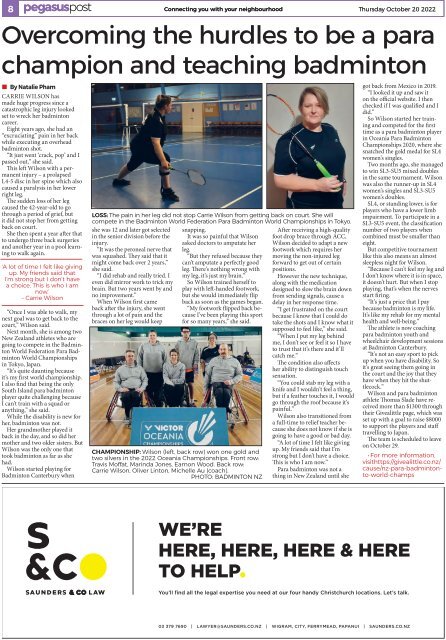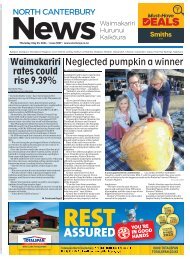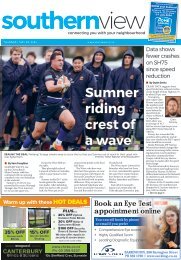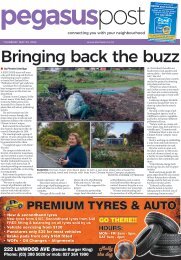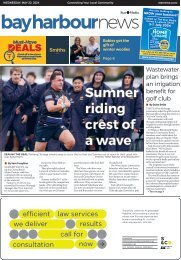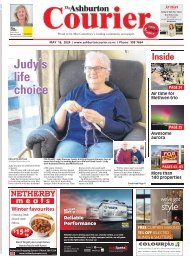Create successful ePaper yourself
Turn your PDF publications into a flip-book with our unique Google optimized e-Paper software.
8 Thursday <strong>October</strong> <strong>20</strong> <strong>20</strong>22<br />
Overcoming the hurdles to be a para<br />
champion and teaching badminton<br />
• By Natalie Pham<br />
CARRIE WILSON has<br />
made huge progress since a<br />
catastrophic leg injury looked<br />
set to wreck her badminton<br />
career.<br />
Eight years ago, she had an<br />
“excruciating” pain in her back<br />
while executing an overhead<br />
badminton shot.<br />
“It just went ‘crack, pop’ and I<br />
passed out,” she said.<br />
This left Wilson with a permanent<br />
injury – a prolapsed<br />
L4-5 disc in her spine which also<br />
caused a paralysis in her lower<br />
right leg.<br />
The sudden loss of her leg<br />
caused the 42-year-old to go<br />
through a period of grief, but<br />
it did not stop her from getting<br />
back on court.<br />
She then spent a year after that<br />
to undergo three back surgeries<br />
and another year in a pool learning<br />
to walk again.<br />
‘A lot of time I felt like giving<br />
up. My friends said that<br />
I’m strong but I don’t have<br />
a choice. This is who I am<br />
now.’<br />
– Carrie Wilson<br />
“Once I was able to walk, my<br />
next goal was to get back to the<br />
court,” Wilson said.<br />
Next month, she is among two<br />
New Zealand athletes who are<br />
going to compete in the Badminton<br />
World Federation Para Badminton<br />
World Championships<br />
in Tokyo, Japan.<br />
“It’s quite daunting because<br />
it’s my first world championship.<br />
I also find that being the only<br />
South Island para badminton<br />
player quite challenging because<br />
I can’t train with a squad or<br />
anything,” she said.<br />
While the disability is new for<br />
her, badminton was not.<br />
Her grandmother played it<br />
back in the day, and so did her<br />
mother and two older sisters. But<br />
Wilson was the only one that<br />
took badminton as far as she<br />
had.<br />
Wilson started playing for<br />
Badminton Canterbury when<br />
LOSS: The pain in her leg did not stop Carrie Wilson from getting back on court. She will<br />
compete in the Badminton World Federation Para Badminton World Championships in Tokyo.<br />
she was 12 and later got selected snapping.<br />
in the senior division before the It was so painful that Wilson<br />
injury.<br />
asked doctors to amputate her<br />
“It was the peroneal nerve that leg.<br />
was squashed. They said that it “But they refused because they<br />
might come back over 2 years,” can’t amputate a perfectly good<br />
she said.<br />
leg. There’s nothing wrong with<br />
“I did rehab and really tried. I my leg, it’s just my brain.”<br />
even did mirror work to trick my So Wilson trained herself to<br />
brain. But two years went by and play with left-handed footwork,<br />
no improvement.”<br />
but she would immediately flip<br />
When Wilson first came back as soon as the games began.<br />
back after the injury, she went “My footwork flipped back because<br />
I’ve been playing this sport<br />
through a lot of pain and the<br />
braces on her leg would keep for so many years,” she said.<br />
CHAMPIONSHIP: Wilson (left, back row) won one gold and<br />
two silvers in the <strong>20</strong>22 Oceania Championships. Front row:<br />
Travis Moffat, Marinda Jones, Eamon Wood. Back row:<br />
Carrie Wilson, Oliver Linton, Michelle Au (coach).<br />
PHOTO: BADMINTON NZ<br />
After receiving a high-quality<br />
foot drop brace through ACC,<br />
Wilson decided to adapt a new<br />
footwork which requires her<br />
moving the non-injured leg<br />
forward to get out of certain<br />
positions.<br />
However the new technique,<br />
along with the medication<br />
designed to slow the brain down<br />
from sending signals, cause a<br />
delay in her response time.<br />
“I get frustrated on the court<br />
because I know that I could do<br />
take the shots and I know what it<br />
supposed to feel like,” she said.<br />
“When I put my leg behind<br />
me, I don’t see or feel it so I have<br />
to trust that it’s there and it’ll<br />
catch me.”<br />
The condition also affects<br />
her ability to distinguish touch<br />
sensation.<br />
“You could stab my leg with a<br />
knife and I wouldn’t feel a thing,<br />
but if a feather touches it, I would<br />
go through the roof because it’s<br />
painful.”<br />
Wilson also transitioned from<br />
a full-time to relief teacher because<br />
she does not know if she is<br />
going to have a good or bad day.<br />
“A lot of time I felt like giving<br />
up. My friends said that I’m<br />
strong but I don’t have a choice.<br />
This is who I am now.”<br />
Para badminton was not a<br />
thing in New Zealand until she<br />
got back from Mexico in <strong>20</strong>19.<br />
“I looked it up and saw it<br />
on the official website. I then<br />
checked if I was qualified and I<br />
did.”<br />
So Wilson started her training<br />
and competed for the first<br />
time as a para badminton player<br />
in Oceania Para Badminton<br />
Championships <strong>20</strong><strong>20</strong>, where she<br />
snatched the gold medal for SL4<br />
women’s singles.<br />
Two months ago, she managed<br />
to win SL3-SU5 mixed doubles<br />
in the same tournament. Wilson<br />
was also the runner-up in SL4<br />
women’s singles and SL3-SU5<br />
women’s doubles.<br />
SL4, or standing lower, is for<br />
players who have a lower limb<br />
impairment. To participate in a<br />
SL3-SU5 event, the classification<br />
number of two players when<br />
combined must be smaller than<br />
eight.<br />
But competitive tournament<br />
like this also means an almost<br />
sleepless night for Wilson.<br />
“Because I can’t feel my leg and<br />
I don’t know where it is in space,<br />
it doesn’t hurt. But when I stop<br />
playing, that’s when the nerves<br />
start firing.<br />
“It’s just a price that I pay<br />
because badminton is my life.<br />
It’s like my rehab for my mental<br />
health and well-being.”<br />
The athlete is now coaching<br />
para badminton youth and<br />
wheelchair development sessions<br />
at Badminton Canterbury.<br />
“It’s not an easy sport to pick<br />
up when you have disability. So<br />
it’s great seeing them going in<br />
the court and the joy that they<br />
have when they hit the shuttlecock.”<br />
Wilson and para badminton<br />
athlete Thomas Slade have received<br />
more than $1300 through<br />
their Givealittle page, which was<br />
set up with a goal to raise $8000<br />
to support the players and staff<br />
travelling to Japan.<br />
The team is scheduled to leave<br />
on <strong>October</strong> 29.<br />
• For more information,<br />
visithttps://givealittle.co.nz/<br />
cause/nz-para-badmintonto-world-champs<br />
WE’RE<br />
HERE, HERE, HERE & HERE<br />
TO HELP<br />
You’ll find all the legal expertise you need at our four handy Christchurch locations. Let’s talk.<br />
03 379 7690 | LAWYER@SAUNDERS.CO.NZ | WIGRAM, CITY, FERRYMEAD, PAPANUI | SAUNDERS.CO.NZ


